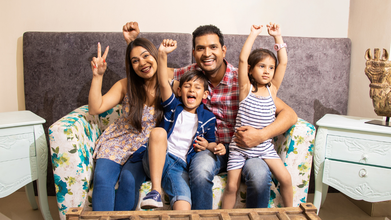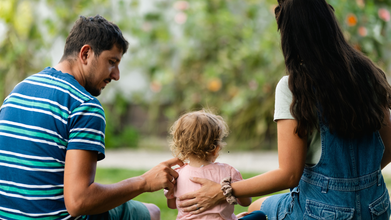- Health Conditions A-Z
- Health & Wellness
- Nutrition
- Fitness
- Health News
- Ayurveda
- Videos
- Medicine A-Z
- Parenting
Is Strict Parenting Hurting Your Child's Self-Esteem? Here's The Truth

Are Strict Parents Always the Culprits of Low Self-Esteem?
Just imagine having parents who expect nothing less than perfect; everything in your test must score above 90, all actions require confirmation, and anything below their standards gets you a scolding or disappointment. Or on the flip side, imagine having absolutely no rules in place; you're free to make choices without any direction. Would either of these conditions help provide confidence and healthy self-esteem?
I can talk to some of them and relate real-life experiences about childhood and how very strict parents might affect a person's self-esteem.
"I Grew Up Following Rules, but Was I Ever Really Free?"
Sarah (name changed) is a 28-year-old software engineer who shares some childhood experience growing up with strict parents. "My parents were really strict. I had to follow their rules no matter what, and if I didn't, I'd get scolded. My whole life was all about academics. I didn't have many friends because I was too focused on school, and they got angry if my grades were anything less than 90."
Sarah's is one of those classic cases for children raised by high-expectation parents. Where structure and rules are found, the emotional aspect is usually missing which would breed chaos. "I grew up as someone who would ask them to get permission for everything. Whenever school was unbearable or if I was not getting along with other kids, they never comforted me with anything like, 'It's going to be all right.' I felt alone and scared of making my own decisions."
Like Sarah, most children of demanding parents cannot make independent decisions. The fear of mistakes and subsequently the disapprobation can weaken their self-confidence. According to Sarah, "Interviewing others with strict parents, they told me they experienced the same thing growing up feeling like they didn't know how to make decisions or how to interact socially."
Are Strict Parents Always the Culprits of Low Self-Esteem?
The connection between strict parenting and self-esteem is much more complex than it would seem at first glance. While, on one hand, children like Sarah often find themselves struggling with low self-esteem due to obedience and achievement without emotional support, on the other hand, not everyone believes it is strictly the strictness that creates a problem, but rather the character of the rules and the emotional context in which they are enforced.
The case is that of Sebin (name changed), a 33-year-old entrepreneur from Kerala brought up in a house with equally severe parents. While his parents had high expectations, much like Sarah, he did not feel crushed under parental expectations: "My parents were strict but not controlling over every move. They believed in discipline, but also encouraged me to grow on multiple parameters.". It was not just a matter of good grades; they always stretched my capabilities in other types of areas, such as sports and music.
"There were moments where I didn't meet their expectations, and sure, it was tough, but I knew they pushed me because they believed I could meet those goals. That made a huge difference. It didn't crush my confidence; it built it." Kevin reports that the high expectations from his parents were translated as respect by him. As they believed in his ability to do well, this became the basis for higher self-esteem in him.
Importance of Fairness and Balance in Parenting
What makes the experiences of Sarah and Kevin different? The difference lies in the rationality of the rules set by parents. But perhaps it is in the emotional climate fostered by parents. Sebin's parents had rather big expectations but clearly communicated the message that they were all for him. It was a situation where he was allowed to roam about in the different circles of life and experience his mistakes, giving him competence and personal agency, he says.
On the contrary, with choking strictness or arbitrariness-in this case, likened to the rules imposed by Sarah on the child-victims-children get entrapped and bottled up instead of getting guided. Strangely, strictness per se does not suffice in building self-esteem but depends on whether the rules imposed are fair and just. Actually, it is in fact when children feel that support would come to meet expectations that they develop the confidence to succeed for themselves.
Criticism vs. Strictness: A Thin Line
Low self-esteem can also emerge from a critical environment rather than strictness itself. Take, for instance, Jia, a 40-year-old marketing manager who is a mother herself from Hyderabad. "My parents were not only strict; they were overly critical. It was not just about rules; they were negative about everything I did. I loved horses, but my mom would constantly ask, 'Why do you even like horses? ' in an offended voice.
Though they paid for me to take riding lessons, they never once came to watch, nor did they ever try to encourage me."
For Jia, it wasn't the rules per se it was the failure to give emotional support and encouragement. "It was not the discipline that damaged my self-esteem. It was their ceaseless criticism, as if everything I was doing would never be good enough for them."
Although many such tyrannized children grow up successful, this is only possible under such a strict regime of rules and emotional validation. In this respect, Jia's case illustrates that the problem with rules isn't that one must have them; it is the way in which those rules are delivered and the extent to which a child's interests and abilities are validated by their caregivers.
That is the ideal kind of parenting: balance. While rules and expectations will teach discipline, emotional support is necessary to boost a child's confidence, knowing that their parents believe in them able to get things done, even when they fall short. This is the reason two-parent households or involved caregivers can make all the difference-each parent might bring their own strong qualities to the table, creating the perfectly balanced environment.
Strict parenting has no direct relation with low self-esteem. Instead, the degree of imposing limits and offering emotional support creates that confident image for the child. Be your parents strict or lenient, what matters most is whether they showed you they believed in your potential.
End Of 'Gentle Parenting'? Why Gen Z Parents Are Turning To 'FAFO'

Credits: iStock
Parenting expert Bethany Braun-Silva in a conversation with ABC News says that 2025 was the banner year for gentle parenting, but the tide is shifting now. However, she notes, "parents are understanding now that emotional awareness and empathy is as important as setting firm boundaries and parental expectations." This is why 2026 is now becoming a year when there is a shift away from gentle parenting. She notes that gentle parenting actually stands for firm boundaries, however, "some people rode that 'gentle' train too seriously".
An article by Mother.ly notes that critics often argue that gentle parenting often blurs the line between kindness and permissiveness. It argues that this leaves parents at the risk of being seen as pushovers. In fact, new research shows that it is the Gen Z parents who are moving away form "gentle parenting".
What Is The New FAFO Parenting Style Gen Z Moms And Dad Are Switching Too?
Another Wall Street Journal piece notes that more and more parents are now embracing FAFO, which is short for F-Around and Find Out. What does it mean? The idea is that parents can ask and warn their children, but if the child breaks the rules, parents cannot stand in the line of repercussions. "Won’t bring your raincoat? Walk home in the downpour. Didn’t feel like having lasagna for dinner? Survive until breakfast. Left your toy on the floor again? Go find it in the trash under the lasagna you didn’t eat," notes the WSJ.
Parenting styles that emphasized minimal discipline have shaped child-rearing over the past few decades. Critics now argue that this approach has contributed to some of Gen Z’s struggles in adulthood. They point to surveys showing young adults grappling with workplace relationships and rising anxiety and depression, questioning whether constant parental intervention and a reluctance to say “no” played a role.
For parents who have spent years trying to balance emotional support without tipping into permissiveness, FAFO can feel refreshingly straightforward.
What Is Wrong With Gentle Parenting?
The argument is that gentle parenting puts a lot of pressure on parents, and promote unrealistic expectations. Emily Edlynn, a licensed clinical psychologist who specializes in pediatric health psychologist writes for Psychology Today, that gentle parenting "adds stress to parenting that we don’t need. Higher stress undoubtedly impacts our relationship with our child in a negative way, more so than having our authentic moments of being human".
She argues that it is okay for parents to show frustration with a child who has asked the same question for the seventeenth time because the child did not like the answer. She says that expressing is better than holding all the frustration in. In fact this shows a natural demonstration of feelings and teaches the child to be expressive too.
Gentle parenting discussions often blur the line between punishment and discipline. Decades of research show that behavioral tools are not inherently punitive and can be an effective part of discipline. Discipline is meant to teach, while punishment is not. It is possible to combine emotional connection with clear consequences.
This One Habit That Parents Hate May Be Good For Children's Mental Health

Credits: iStock
A habit that all parents hate could improve children's mental health. What is this? A new study published in The Journal of Affective Disorders is challenging one of the most common weekend arguments between parents and teenagers. Letting teens sleep in on weekends, something many parents see as laziness or poor discipline, may actually protect their mental health and lower the risk of depression.
The research was conducted by scientists from the University of Oregon and the State University of New York Upstate Medical University. They analyzed data from more than 1,000 young people between the ages of 16 and 24. Participants reported their usual sleep and wake times during the week and on weekends, including how much extra sleep they got by sleeping in on non-school days.
What Did The Study Find?
The findings were striking. Teens and young adults who allowed themselves to catch up on sleep over the weekend were significantly less likely to report symptoms of depression. In fact, those who slept in had a 41 per cent lower risk of depression compared to peers who stuck to the same early wake-up routine even on weekends.
This may sound counterintuitive to parents who believe that waking up early every day builds discipline and mental toughness. But researchers say adolescent biology tells a very different story. During puberty, the body’s internal clock shifts, making teens naturally inclined to fall asleep later at night and wake up later in the morning.
“Instead of being a morning lark, you’re going to become more of a night owl,” Melynda Casement, associate professor at the University of Oregon and co-author of the study, explained in a conversation with ScienceDaily. She added that this shift toward later bedtimes often lasts until around the ages of 18 to 20 before gradually stabilizing.
Why Does This Problem Arise?
The problem is that school schedules and daily responsibilities do not adapt to this biological change. Early school start times, homework, coaching classes, extracurricular activities, social commitments and even part-time jobs mean many teens are forced to wake up before their bodies are ready. Over time, this leads to what experts call “sleep debt”.
Casement points out that teenagers ideally need eight to ten hours of sleep each night, but most fail to get enough during the week. This chronic sleep deprivation has been closely linked to low mood, emotional regulation issues and a higher risk of depression. Weekend sleep, she says, can help offset some of that damage.
“It’s normal for teens to be night owls,” Casement notes. Allowing them to catch up on sleep over the weekend, especially when weekday schedules make adequate rest impossible, may offer meaningful mental health protection.
The study adds to a growing body of evidence supporting this idea. A 2025 meta-analysis of 10 studies found that weekend catch-up sleep was associated with a 20 per cent lower risk of depression. Taken together, the research suggests that sleeping in is not simply teenage rebellion or laziness, but a coping mechanism for an exhausting weekly routine.
At a time when concerns about adolescent mental health are rising globally, those extra hours of weekend sleep may be doing more good than parents realize. Sometimes, letting your teen sleep in might be one battle worth losing.
Parents Are Now Preferring Girls Over Boys; What Led To This Shift?

Credits: iStock
Not too long ago, in 2000, 1.6 million girls were missing from the number given at the natural sex ratio at birth, 26 years later, the number is at 200,000, and it is still falling. What has changed? The Economist reported that more and more parents are now preferring girl child over boys.
Earlier, parents were desperate for a boy, or did not just want a large family. In fact, in China, people would routinely terminate females. The practice of aborting girls is now becoming less common. The natural ratio is about 105 boy babies for every 100 girls. This is also because boys are more likely to die young, which could lead to rough parity at reproductive age. Sex ratio at birth has become more even across Asia. In 2006, China reported the peak of 117.8 boys per 100 girls, which went down to 109.8 in 2025. India too fell from 109.6 in 2010 to 106.8. In South Korea, in 1990, it was 115.7, which has now come back to normal.
Why Is There A Shift In Baby Preference?
There was a sexist tradition that believed that men mattered more. This came from the expectation that daughters will grow up and serve her husband's family. This is why parents preferred baby boys who would look after them in old age. Another idea is of dowry, to marry off a woman, the parents needed to have a stronger financial and economic backing, so the dowry could be paid at the time of her marriage. This is why many families did not want girl child. While these sexist ideas have not completely vanished, there are evidences that they are slowly fading away.
Secondly, this selective abortion has become a weapon against men, as it has led to lifelong bachelorhood. In China, they are known as "bare branches", and they were the ones who resented it intensely. Their anger also had wider social consequences. Large numbers of young, unmarried men are more likely to fuel instability and violence. Studies across several Asian countries have linked distorted sex ratios to higher rates of rape, violent crime in China, stricter policing to control unrest, and even greater risks of civil conflict or war elsewhere.
In India, especially in Haryana, bride buying, a controversial practice was found as a substitute for the lack of girls to marry the sons. These brides were purchased from backward economic background, which often led to exploitation.
As son preference declines, many societies are becoming safer.
At the same time, a subtle shift toward preferring daughters is emerging in some regions. This trend is far less extreme: parents are not eliminating boys, nor does any major country show a surplus of girls. Instead, the preference appears in attitudes and behavior. In Japan, couples wanting just one child tend to favour girls. Globally, parents often want both sexes, but in the US and Scandinavia, couples with sons are more likely to have additional children, suggesting a desire for daughters. Adoption data show families willing to pay more for girls, and where sex selection through IVF is legal, more women are choosing female embryos.
What Makes Parents Prefer Girl Child?
People are preferring girls for all sorts of reasons, which are:
- Some thing they are easier to bring up
- Some cherish what they see as "feminine" traits
- Some think that daughters are better at looking after elderly parents
The emerging preference for daughters also mirrors growing anxiety about how boys are faring. Boys have long been more likely to run into trouble, globally, 93% of the prison population is male. In many countries, they are also falling behind girls in education. In wealthier nations, 54% of young women hold a tertiary degree, compared with 41% of young men. While men remain overrepresented at the very top, in boardrooms, they are also increasingly overrepresented at the bottom, disengaged, isolated, and angry.
These trends have put boys’ struggles on governments’ radar. Because boys tend to mature later, some experts argue for starting them a year later in school. Others suggest more male teachers, especially in primary education, where they are scarce, to provide role models. Stronger vocational training could also steer boys toward careers traditionally avoided by men, such as nursing. Supporting struggling boys does not mean disadvantaging girls, just as giving glasses to someone with poor eyesight does not harm those with perfect vision.
Looking ahead, technology will give parents more choices. Some will be widely accepted, such as editing genes to prevent severe inherited diseases. But expanding access to sex-selection technologies raises harder questions. Couples undergoing fertility treatment can already choose sperm or embryos by sex, and as these methods become cheaper, their use may spread. Even more concerning, early blood tests can reveal an embryo’s sex within weeks, potentially enabling sex-selective abortions through medication, even among parents who conceive naturally.
© 2024 Bennett, Coleman & Company Limited

